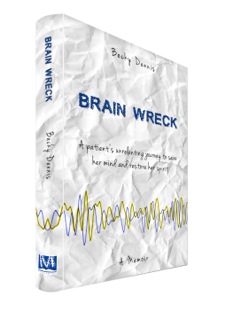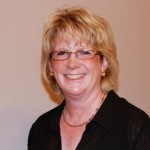It’s a nightmare that’s hard to contemplate. My good friend Becky Dennis, who’s worked in outsourcing for many years, was thousands of miles from home after delivering a pitch to a group of executives.
That success under her belt, she looked forward to the long trip home. Only thing is, a couple of hours later she forgot how to walk. It was too hard to talk. And she was struck by an odd series of neurological deficits that baffled her and a dozen doctors she’d eventually see over the course of 27 months.
But, as anyone who knows Becky would’ve predicted, she didn’t give up. So, here we are a few years later, and Becky is telling her remarkable story in Brain Wreck. It’s an honest, humorous account of her journey to restore her spirit and get to the bottom of her illness. I recommend it highly.
After marveling at the book, I was thrilled to have the chance to chat with Becky about her experiences.
Phil Fersht (HfS): Hi Becky – It’s so refreshing to have a good friend and colleague write such a personal book about their own life and experiences. Can you tell our readers what inspired you to put pen to paper?
Becky Dennis (Author, Brain Wreck): In fact, there were quite a few events that inspired me , but one in particular I’ll mention here. After suffering a serious illness in 2008 that caused encephalitis (swelling of the brain), I went down a very long path of searching for a diagnosis that fit my symptoms — 27 months to be exact. I’m hopeful that by telling my story, it might help others who suffer from similar neurological challenges to get a faster diagnosis. Encephalitis is often misdiagnosed as stroke, MS, flu or complex migraine. If I can raise awareness, along with the efforts of others, of the short- and long-term effects of the illness, doctors might consider this diagnosis earlier in the process. Very few forms of encephalitis are treatable with medication, but the encephalitis caused by the herpes virus, which most adults carry in their systems (most often causing cold sores and mouth sores) CAN be treated with Acyclovir. If those patients don’t receive Acyclovir, 80 percent die within the first week of onset.
Most medical professionals have little insight into the patient’s experience beyond the acute phase (first month). I’m grateful that the book is already circulating among leading neurologists and medical professionals across the U.S. and UK thanks to a recent event hosted by a board I’m on, Encephalitis Global, Inc. Several of the doctors who presented at our event are getting the word out among the medical community so doctors can better understand the residual effects from this sometimes undetected, misdiagnosed illness.
Most causes of encephalitis, whether bacterial, viral or auto-immune, have no protocol for treatment or therapy in the U.S. Most patients, like I was, are seen in the acute phase, then left to fend for themselves. A handful of doctors are actively working with survivors like me, Encephalitis Global and the Encephalitis Society of the UK to establish protocols so that patients diagnosed with encephalitis have a more optimal recovery through a suggested path of treatments, therapies and medications. This can happen to anyone and of the survivors I’ve met, some have been lawyers, doctors and other business professionals. None of us are immune, so it makes awareness that more critical.
Phil: What are the key messages you want people to take away from the book?
Becky: I’m hopeful that readers will be inspired to be their own advocate when it comes to rare illnesses, whether life-changing or not. Throughout my journey, I applied many strategies that I learned from my own career in outsourcing to work with the medical professionals I saw. One is that, even though someone is senior to you in the company, that colleague is not always right just because of their title. It is the same with doctors. Even though they have a medical degree, we have the option of questioning them. They don’t always have all the answers, and we must not accept a lack of answers as a closed door. They try hard, but getting multiple medical opinions is important. Find one who can help be an advocate with you in the absence of answers.
Also, dressing for the part is a trick I learned along the way. If I wore the formal business attire that I might wear to an important client meeting, doctors took me more seriously. The same effect occurred if I sent a cover letter in advance of an appointment to explain the purpose for my visit. This meant the doctor already knew my reason for being there and had given it some thought before my arrival. This made my appointments more effective, especially given a doctor’s limited time with each patient.
Additionally, very few forms of encephalitis are preventable, as seen in this year’s epidemic of the West Nile Virus in the U.S. However, for Japanese Encephalitis (JE) in Asia, which kills one in three people, a vaccination is available. I’m hopeful that more business travelers will consider their destination and inquire about the vaccinations available before traveling.
Phil: It is said that we all have one good book within us… So would you ever write another book?
Becky: You’re right, Phil. I think we all have a book in us. Everyone is so interesting in their different experiences. For me, writing has always been a passion. I definitely have others in my future, but I’m also quite focused on my career. I took time between jobs to be able to write this or otherwise I couldn’t have done both. I’m thankful that the outsourcing industry has taught me so many valuable skills that prepared me to actually survive this illness and document my journey. All of the companies I’ve worked for have offered leadership, writing, strategic planning and public speaking opportunities that have enabled me to tell the story and know how best to reach the influential medical professionals who are helping make my inspiration something that is “actionable.”
Phil: You’ve been a loyal follow of Horses for many years, is there anything else you’d like to share with our readers?
Becky: Keep a sense of humor. One of the things I like about HfS is that the content is practical and applicable. But one of the things I love is that it’s light hearted. We all work very hard and we need to balance the 24×7 demands with a sense of humor. Despite the hurdles from my illness and the demands of our industry, keeping it light is so important. And so is maintaining the right balance of family and career.
Thanks for the opportunity, Phil. I hope that readers will get at least one valuable nugget from this.
Phil: Best of luck with the book, Becky – and congratulations on being the first outsourcing executive to write a book not about outsourcing 🙂
Posted in : HfSResearch.com Homepage, Outsourcing Heros








As Becky’s boss during much of this time, i can say that she took professionalism to an unheard-of level. Other than doctor’s appointments, i was not aware of the extent of her challenges. An example for all of us.
Terrific book, a great description not only of Becky’s journey, but of the common struggles many with encephalitis have gone through to get recognition and treatment.
I wondered about the comment from Becky’s boss, clearly meant as a compliment. Does professionalism really demand that people can’t communicate what is going on? Seems to me that this silence, often coming from a fear of losing a job (perhaps one’s health insurance) as well as professionalism at the job, is one of the reasons so little has been known about the effects of encephalitis.
Becky, thats very brave and inspiring. I had no clue of this even as we worked briefly. You are definitely an inspiration.